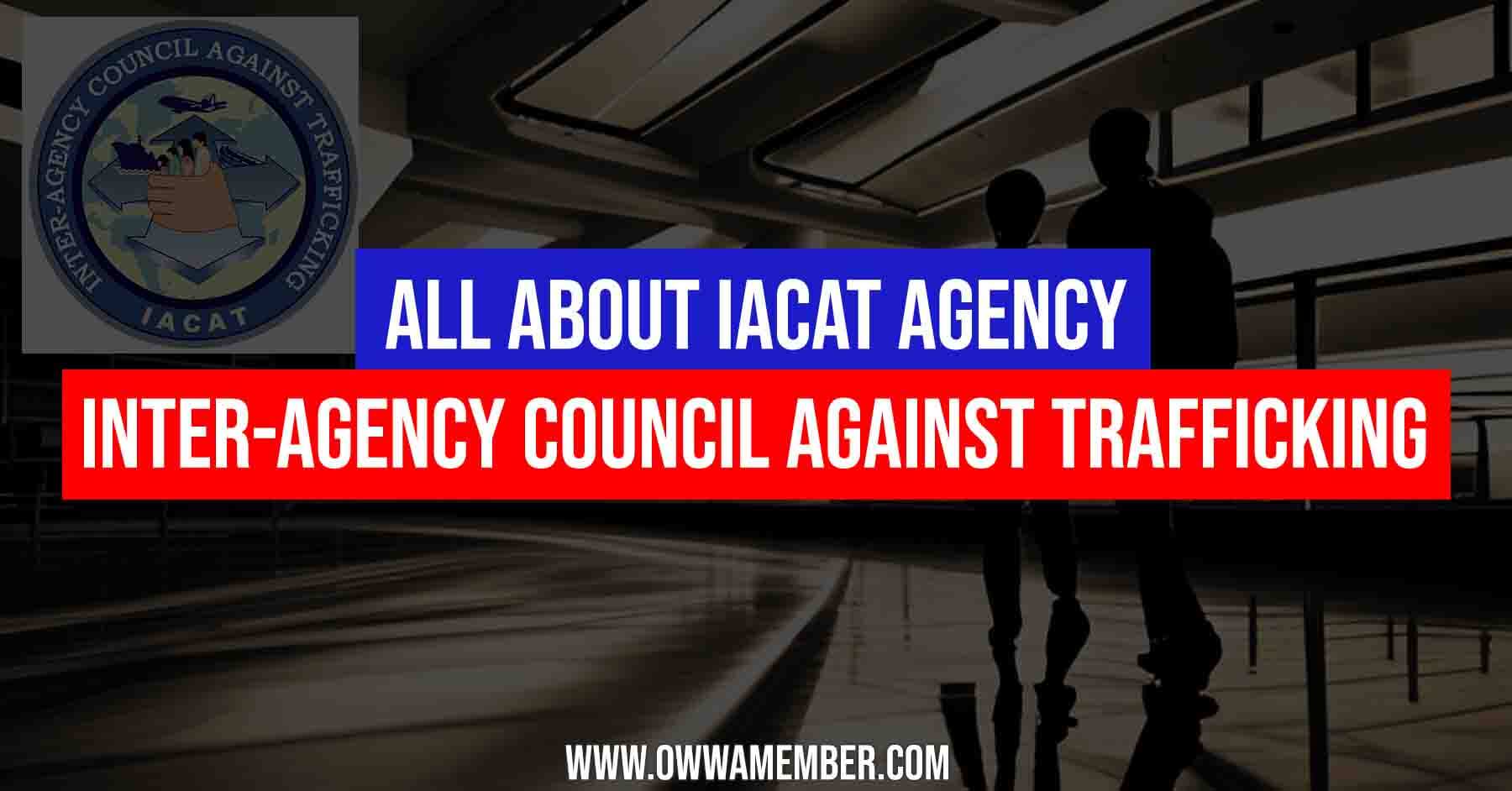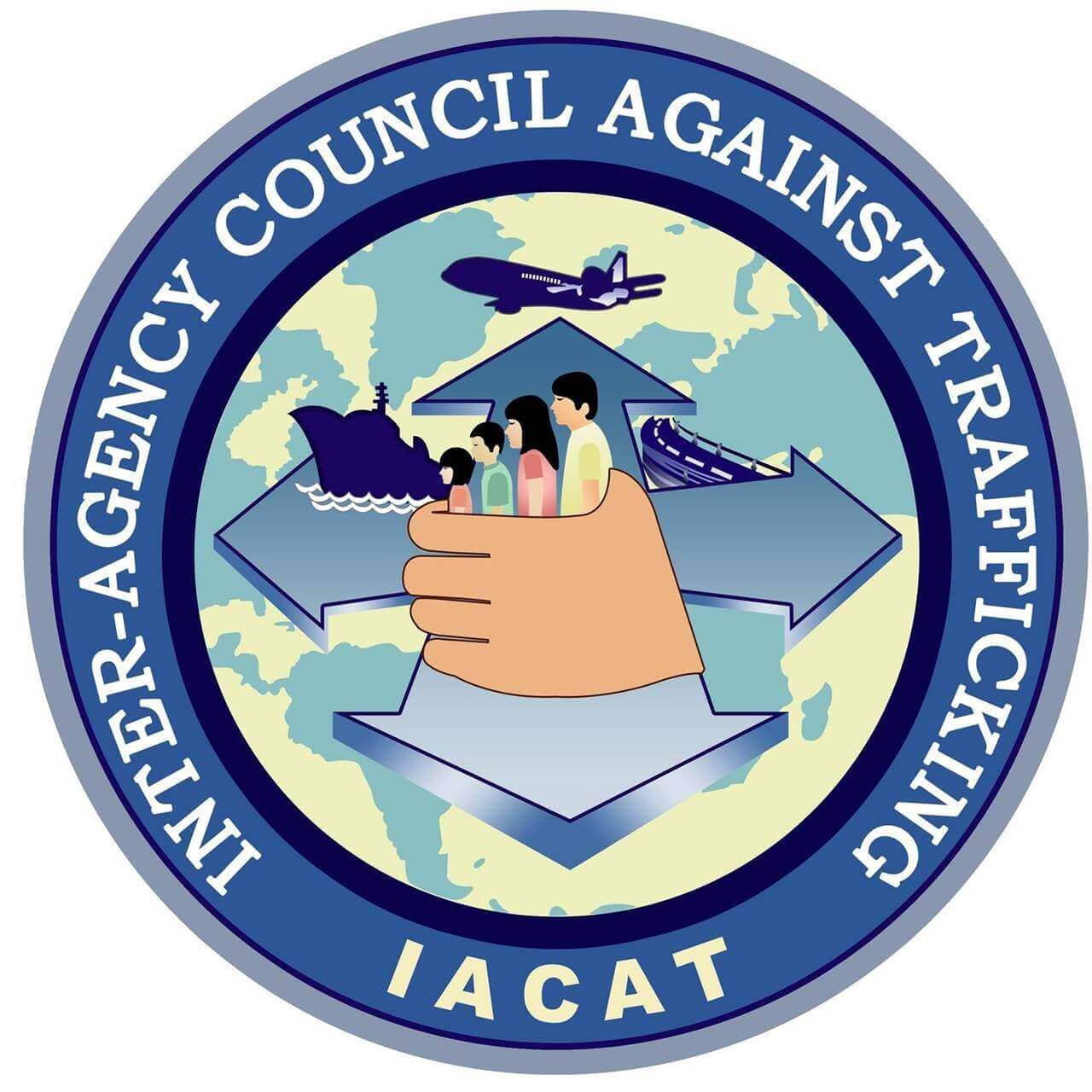The Department of Justice is the lead agency in the Inter-Agency Council Against Trafficking (IACAT), which is tasked by law with coordinating and overseeing the application of Republic Act No. 9208, also often known as the Anti-Trafficking in Persons Act of 2003. It was established by R.A. 9208 and is made up of the following representatives from the public and private sectors.
Also read: Philippine Requirements to Travel Abroad (Filipino Passengers International Travel)
Contents
- What is IACAT?
- Inter-Agency Council Against Trafficking (IACAT) Guidelines on Departure Formalities for International-Bound Filipino Passengers – Revised Guidelines as of 3 September 2023
- Video: IACAT to implement revised guidelines for int’l-bound travelers starting Sept. 3 | INQToday
- Frequently Asked Questions
- Summary

What is IACAT?
The IACAT works on a wide range of initiatives aimed at eliminating human trafficking in the Philippines, preventing it from happening in the first place, assisting victims in their rehabilitation, and prosecuting those who engage in it.

Inter-Agency Council Against Trafficking (IACAT) Guidelines on Departure Formalities for International-Bound Filipino Passengers – Revised Guidelines as of 3 September 2023
All Filipino travelers with overseas trips are required to go through immigration inspection for evaluation, clearance, and documentation.
Basic Travel Documents
- Passport that is still valid six (6) months or more after the departure date
- Boarding pass
- Current visa
- Confirmed round-trip or return ticket
Additional Supporting Documents
The IO may ask pertinent clarifying questions and, if necessary, request the passenger to present additional supporting documentation, as follows:
- Passengers Travelling as Tourists
Self-Funded Travels
- Proof of lodging reservations
- Financial capacity or a source of income suitable for the traveler
- Declared objective for the trip;
- Employment verification and other similar documents.
Sponsored Vacations
If the foreign sponsor is a first (1st) degree civil relative of the passenger:
- Original birth certificate/report of birth or marriage certificate/report of marriage issued by the Philippine Statistics Authority (PSA) as proof of the first (1st) civil degree relationship
- Copies of the sponsor’s supporting documentation, such as:
- Valid Passport
- Valid work visa, residency permit, or another similar document
- OEC, E-receipt, or OFW Clearance
If the foreign sponsor is a fourth (4th) degree civil relative of the passenger:
- Original Affidavit of Support and Guarantee (AOSG) that has been duly notarized, authenticated, and apostilled by the Philippine Embassy, Consulate, or Honorary Consulate (for non-Apostille countries) or by the apostille authority in the destination country (for Apostille countries).
- Original PSA-issued documents proving the precise relationship between the sponsor and the passenger, such as a marriage certificate or birth certificate, if applicable.
If the sponsor abroad is a non-relative or a legal/juridical entity
- Original Affidavit of Support and Guarantee (AOSG) that has been duly notarized, authenticated, and apostilled by the Philippine Embassy, Consulate, or Honorary Consulate (for non-Apostille countries) or by the apostille authority in the destination country (for Apostille countries).
- Substantial evidence of a relationship
- Registration documents for the sponsor if they are a legal or judicial entity
If travelling with a local sponsor
- Affidavit that the local sponsor has signed and has notarized
- Substantial evidence of a relationship
- Copy of the sponsor’s return ticket that matching the itinerary of the passenger
- Travelling as Overseas Filipino Workers (OFW)
OFWs Departing for the First Time
- OEC, E-receipt, or OFW Clearance
- Employment Contract
- Depending on the situation, the Migrant Workers Office (MWO) may have authorized or confirmed the Visa Usage Undertaking or Manpower Request outlining visa usage.
- OEC, E-receipt, or OFW Clearance
Direct-Hire
- OEC, E-receipt, or OFW Clearance
OFWs Requiring Special Travel Exit Clearance in lieu of OEC
- Locally employed seafarers who will be manning a Philippine-registered ship’s passage from a foreign port to the Philippines.
- Seafarers who have to undergo orientation and other such circumstances before starting employment, as specified by the potential foreign employer. An authorized local employment firm must accredit the overseas employer.
- Emergency crew changes for ships with Philippine registration berthed in foreign ports.
OFWs traveling to other countries during their vacation in the Philippines
If the OFW is planning on visiting another country or country for tourism but returning to the Philippines initially.
- Confirmation of hotel reservations or lodging
- Financial capacity or an income source that is compatible with the traveler’s stated purpose of the trip
- Employment Contract or similar documents
If the OFW plans to visit another country or countries for tourism but then goes straight to the place of his or her job.
- OEC, E-receipt, or OFW Clearance
- Traveling Minors
Minors Traveling with parent/s
- Original PSA-issued birth certificate documents
- Guardian’s original marriage certification, issued by PSA
Travels Requiring Department of Social Welfare and Development (DSWD) Clearance or Certificate of Exemption
In any of the following circumstances, passengers traveling with a minor must show a DSWD TCC:
- If the minor is traveling without the mother and the parents are not married
- If the minor is traveling without his or her parents
- If the passenger is older than 18 but is unable to adequately care for themselves or defend against cruelty, exploitation, abuse, or discrimination due to physical or mental disabilities
Minors under thirteen (13) years of age are not permitted to travel alone.
In any of the following circumstances, passengers traveling with a minor must submit a DSWD Certificate of Exemption from TCC:
- if the parents are not married and the child is traveling with the biological father, who is the only person legally allowed to raise or have custody of the child
- If the companion is the child’s legal guardian
- Those who are the children of married parents and are traveling with a grandmother or other close relative
- Those who are orphans whose parents are not married and who are traveling with their substitute parent(s) or next-of-kin on their maternal side
Minors Subject of Adoption
In any of the following circumstances, the passenger must submit the applicable documents:
- Travel authorization granted by the National Authority for Child Care (NACC) to the adoptive parent(s) and adopted minor
- Travel Clearance Certificate from DSWD
- A demonstration or notice regarding the proposed trip, duly delivered to the court where the matter is currently proceeding, and submitted at least seven (7) days before the trip’s intended date
- NACC-issued travel authorization for the prospective adoptive parent(s)
- Adoptee Travel Clearance Certificate from the NACC;
- Clearance from the CFO, or Commission on Filipinos Abroad
- Other Categories of Passengers
Dependent Family Members Joining the OFW at the Job Site
- OEC, E-receipt, or OFW Clearance
Passengers Requiring Clearance from the CFO
- Filipinos having immigrant, resident, spouse, long-term partner, prospective marriage, family reunification, or other similar visas who are the spouse, fiancé(e), or partner of a foreign national
- First-time Filipino immigrants, those having a resident visa, permit, or Permanent Resident Card, and those registering with CFO for the first time
- Filipinos with J1 visas or participants in the exchange visitor program traveling to the United States
- Travelers who hold an Au Pair Visa
- Clearance from CFO
Students under the International Student Affairs Program (ISAP) or Student Internship Abroad Program (SIAP) of the Commission on Higher Education (CHED)
- Endorsement letter from CHED
Students Traveling for Scholarship/Studies Abroad
- Acceptance letter from the foreign institution or school
- Notarized affidavit signed by the scholar or student stating the name of the school and the length of the program or course of study
- Confirmed return or roundtrip ticket that, if possible, corresponds to the program’s duration;
- Proof of financial stability or academic funding, scholarship, or support
- If applicable, endorsement for Arabic-speaking academics from the National Commission on Muslim Filipinos (NCMF)
- A certification from the Superintendent of the School Division must be given by learners in basic education participating in an international exchange program or competing overseas
- A DSWD Travel Clearance Certificate if the student in concern is a minor traveling alone without their parents or legal guardians/legal guardian, a DSWD Travel Clearance Certificate shall also be required.
Passengers Traveling for Training or Skills Enhancement, Final Interview, or Qualifying Examination for Prospective Employment Abroad
- Documents that are important and relate to the trip’s objectives
- A passenger’s properly certified declaration detailing their itinerary and purpose for travel
Passengers Traveling Abroad for a Compassionate or Humanitarian Visit to a Filipino Overseas
- Certification from the DMW or the DFA, stating the reason for the trip
Passengers Traveling for Intra-Company Transfers Abroad
- Proof of local employment as verified by the Department of Labor and Employment (DOLE)
- If necessary, a secondment agreement between the domestic or local company and the overseas host company
Passengers Traveling for Intra/Inter-Company Trainees Abroad
- Proof of work within the local area, as verified by DOLE
- Agreement for a Traineeship that has been properly validated by the Philippine Embassy or Consulate, depending on what is required for the training or skill development
Passengers Travelling for Volunteer Works Abroad
- Endorsement Letter from the PNVSCA
Passengers Travelling as Hajj Pilgrims to Mecca
- Endorsement/List of Pilgrims from the NCMF
Passenger Traveling for Organ Donation or Transplantation Abroad
- Clearance from the Department of Health (DOH) allowing the organ donation transplant organs
Passengers Traveling for Government-Endorsed Trainings
Any one of the following endorsements, if suitable:
- Endorsement by the Department of Agriculture-Agricultural Training Institute (DA-ATI)
- Endorsement for Agro-Studies Trainees
- Endorsement From the applicable government agency’s
Passengers Travelling for Training Endorsed by Private Institution
- Contract for a traineeship that has been properly certified or apostilled by a Philippine embassy or consulate
- Affidavit signed by the trainee and duly notarized that specifies the name of the training school and the length of the training
- Passengers Not Exclusively Falling Under any of the Categories
- Documents that clearly state the reason for the trip
Video: IACAT to implement revised guidelines for int’l-bound travelers starting Sept. 3 | INQToday
The IACAT Agency revised the guidelines, and they became effective on September 3, 2023. Watch the video below to learn more about why the IACAT Agency revised its travel guidelines.
Frequently Asked Questions
If you have any further questions regarding “Inter-Agency Council Against Trafficking (IACAT) Agency”, see the list of frequently asked questions and answers below.
1. What is the IACAT Agency?
All government initiatives that fight human trafficking are coordinated and monitored by the IACAT.
2. What is the purpose of IACAT Agency?
IACAT is responsible for coordinating all government efforts to combat TIP by developing comprehensive and integrated programs.
3. Where can I see the IACAT Agency’s updated guidelines for departure?
You can view the updated IACAT Agency’s guidelines at Department of Justice’s website.
Link: https://www.doj.gov.ph/files/2023/IACAT/2023%20Updated%20Guidelines%20(for%20publishing)_1.pdf
4. What is the IACAT Agency’s hotline number?
You can reach IACAT Agency’s main office at (02) 8525-2131 | (02) 8527-2363
5. What is IACAT Agency’s main office address?
IACAT Agency’s address is at 7th Floor JDC Building, Engracia-Reyes St., Ermita, Manila, 1000 Metro Manila.
6. What is IACAT Agency’s email address?
IACAT Agency’s email address is contactus.iacat@gmail.com.
Summary
The revised guidelines from the International Inter-Agency Council Against Trafficking (IACAT) have been established to clarify all of the prerequisites and documentation that Filipinos must have before traveling; they are not stricter than the previous versions.
The main objective of these guidelines is to reduce the growing number of victims of human trafficking. By outlining clear, uniform departure processes, the IACAT strengthen its defenses against this prevalent threat to the security and welfare of Filipino citizen.